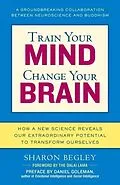For decades, the conventional wisdom of neuroscience held that the hardware of the brain is fixed and immutable-that we are stuck with what we were born with. As Begley shows, however, recent pioneering experiments in neuroplasticity, a new science that investigates whether and how the brain can undergo wholesale change, reveal that the brain is capable not only of altering its structure but also of generating new neurons, even into old age. The brain can adapt, heal, renew itself after trauma, and compensate for disability.
Begley documents how this fundamental paradigm shift is transforming both our understanding of the human mind and our approach to deep-seated emotional, cognitive, and behavioral problems. These breakthroughs show that it is possible to reset our happiness meter, regain the use of limbs disabled by stroke, train the mind to break cycles of depression and OCD, and reverse age-related changes in the brain. They also suggest that it is possible to teach and learn compassion, a key step in the Dalai Lama's quest for a more peaceful world. But as we learn from studies performed on Buddhist monks, an important component in changing the brain is to tap the power of mind and, in particular, focused attention. This is the classic Buddhist practice of mindfulness, a technique that has become popular in the West and that is immediately available to everyone.
With her extraordinary gift for making science accessible, meaningful, and compelling, Sharon Begley illuminates a profound shift in our understanding of how the brain and the mind interact. This tremendously hopeful book takes us to the leading edge of a revolution in what it means to be human.
From the Hardcover edition.
Autorentext
Sharon Begley is the senior science writer at STAT, the life sciences publication of The Boston Globe. Previously she was the senior health and science correspondent at Reuters, the science editor and science columnist at Newsweek, and the science columnist at The Wall Street Journal. She is the author of Can't Just Stop: An Investigation of Compulsions and Train Your Mind, Change Your Brain and the co-author of The Emotional Life of Your Brain (with Richard J. Davidson) and The Mind and the Brain (with Jeffrey M. Schwartz).
Klappentext
Cutting-edge science and the ancient wisdom of Buddhism have come together to reveal that, contrary to popular belief, we have the power to literally change our brains by changing our minds.
Recent pioneering experiments in neuroplasticity-the ability of the brain to change in response to experience-reveal that the brain is capable of altering its structure and function, and even of generating new neurons, a power we retain well into old age. The brain can adapt, heal, renew itself after trauma, compensate for disabilities, rewire itself to overcome dyslexia, and break cycles of depression and OCD. And as scientists are learning from studies performed on Buddhist monks, it is not only the outside world that can change the brain, so can the mind and, in particular, focused attention through the classic Buddhist practice of mindfulness.
With her gift for making science accessible, meaningful, and compelling, science writer Sharon Begley illuminates a profound shift in our understanding of how the brain and the mind interact and takes us to the leading edge of a revolution in what it means to be human.
Praise for Train Your Mind, Change Your Brain
"There are two great things about this book. One is that it shows us how nothing about our brains is set in stone. The other is that it is written by Sharon Begley, one of the best science writers around. Begley is superb at framing the latest facts within the larger context of the field. This is a terrific book."-Robert M. Sapolsky, author of Why Zebras Don't Get Ulcers
"Excellent . . . elegant and lucid prose . . . an open mind here will be rewarded."-Discover
"A strong dose of hope along with a strong does of science and Buddhist thought."-The San Diego Union-Tribune
